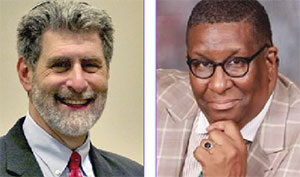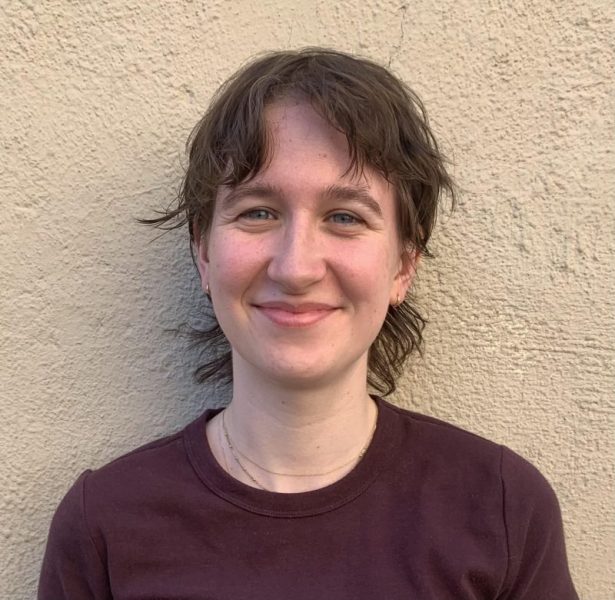Religious Leaders, Grandpas United Discuss Dr. King’s Legacy

The White Plains Youth Bureau Grandpas United hosted a virtual panel discussion between Bet Am Shalom Synagogue Rabbi Lester Bronstein and president of The Ministers Council and Vicinity Rev. Erwin Trollinger to discuss the life and legacy of Dr. Martin Luther King Jr.
The hour-long event, “The Life of Dr. Martin Luther King, Jr. – A Drum Major for Justice,” was held on Zoom and attended by the group’s grandpas and members of the public.
“I love to be with the grandpas of the Youth Bureau and any time we can honor the legend Dr. King and learn from his inspiring message,” Council President and Youth Bureau Board Chair Justin Brasch said. “It begins with treating everyone with dignity and respect, to judge people by the content of their character.”
Trollinger noted the special bond between the African American and Jewish communities, specifically between rabbis and Black clergy during the civil rights movement, which sometimes goes missing in the legacy of King’s life and work.
“Dr. King and his work is the reason why Rev. Trollinger and I have been on each other’s pulpits, spoken in each other’s houses of worship and have this partnership,” Bronstein said.
Bronstein noted that in teaching Jewish children about the ancient prophets in religious school, many children highlight that the prophets’ actions and messages sound like King’s.
“When Martin Luther King opened his mouth and out came those biblical phrases, suddenly we saw the corruption, racism, neglect, poverty and segregation,” Bronstein explained. “A lot of our rabbis hearing those words, they decided to get out there, put on their walking shoes and marched with Dr. King.”
Trollinger emphasized that when King spoke the prophetic word, his message transcended color, race, age, gender and even nation.
“Dr. King was a man that was able to tap into the real humanity that’s inside of all of us to do what is right, even when it’s not popular to do it,” Trollinger said. “Even when there is no praise in doing it, even when your house is burned, even when your wife and children are being threatened, even when people are setting you up.”
In celebrating King’s legacy, Bronstein underscored the importance of not just reading his “I Have a Dream” speech and closing the book.
Instead, Bronstein said, it is important to analyze King’s words line by line and put them in conversation with contemporary issues, asking “To what extent does this speech speak to our horrendous neglect of one another and our society right now?”
Bronstein added that it is also crucial, especially for younger generations, to understand the history of both courage and fear when it came to the civil rights movement.
“Part of the legacy that we have to teach our children is not just the greatness of Martin Luther King as the drum major, but that when he stood up, a lot of the other members of the band ran in the other direction,” Bronstein said. “We have to give ourselves the courage to run in the right direction, follow that drum major, and, of course, give our children the courage to be the drum major in this generation.”
Frozine Reece-Smith, whose husband is a Grandpas United member, asked Bronstein how when young children see the parallels between the ancient prophets and King, he has them reflect further.
“Because that’s where we are today, trying to get the young people to understand the era that we were living through, that we saw,” Reece-Smith said.
Bronstein encouraged that when teaching today’s youth, he often asks them to think about injustices happening in the world today, specifically in their school or city.
By asking them to reflect on contemporary issues, while, at the same time, asking questions like “What was Dr. King marching for? What was he marching against? What were the problems of the time?” children start to identify parallels between the civil rights movement and racial or social issues that persist today, he said.
“We have to teach our children and share the stories,” said Frank Williams, executive director of the White Plains Youth Bureau. “These stories are living in us. History is a part of who we are and what we’ve been through.”
“Most people don’t want to be uncomfortable. We want to be easy and relaxed, but we can’t because the future of our children and nation is at stake,” Williams concluded.

Bailey has journalism experience covering local news in Westchester and Putnam counties and New York City on topics related to LGBTQ+ issues, women’s rights, climate change, the environment, and local politics. They have been a full-time reporter with Examiner Media since July 2021. Read more details from Bailey’s bio here. Read Bailey’s archived work here: https://www.theexaminernews.com/author/baileyhosfelt/
